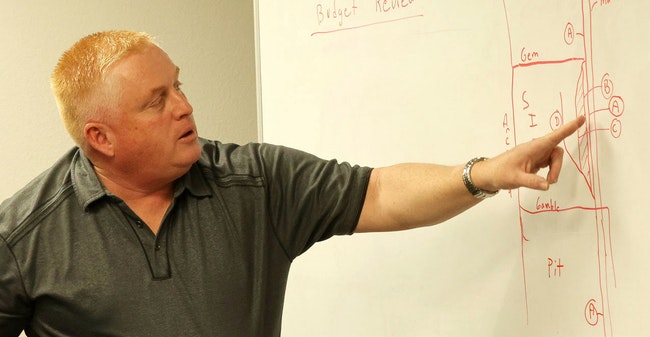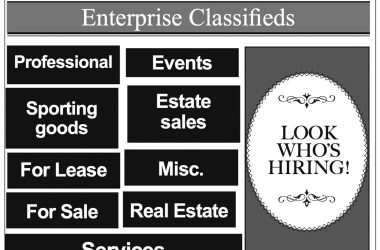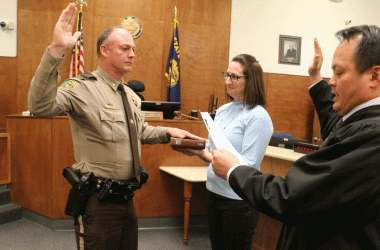
Brad Baird, president of Anderson Perry & Associates, said a change to his company’s contract for work on the Treasure Valley Reload Center is being drafted that he said should have been done earlier. (ANGIE SILLONIS/Special to the Enterprise)
The engineering firm managing Treasure Valley Reload Center construction has charged $500,000 more than its contract allowed in what project officials dismiss as a matter of “paperwork.”
The firm, Anderson Perry & Associates of La Grande, also has twice increased the hourly rate it charges for its workers despite those rates being locked in by contract, an investigation by the Malheur Enterprise established.
The work and costs were anticipated, project officials say, but the necessary legal amendments to the contract were never done. Following questions from the Enterprise, such an amendment is now in the works, they say.
Anderson Perry was contracted by Malheur County Development Corp. in 2019 for work on the Nyssa reload project. The development corporation was set up by Malheur County commissioners to oversee the reload center work.
The snafu over the Anderson Perry contract emerged after public officials detailed the care they said has been applied to reviews of all construction costs.
The effectiveness of those reviews has become an issue as costs for the reload center have soared millions over budget. The excess costs have forced project leaders to shed some features of the industrial project. They still need an estimated $5 million to get the rail shipping center finished later this year or the project will stall.
The Anderson Perry contract matter is the latest of a recent string of financial and budget missteps:
*An estimated $5 million in extra costs developed as ground conditions were worse than expected. The contractor’s agreement for that work was revised months after the costs started accruing.
* Greg Smith, Malheur County economic development director, reported at a public meeting that a $3 million grant was coming from the Legislature. That turned out to be a fiction.
*A state public works fund cited was wrongly cited by Smith as a possible source for money to fill the budget gap. State officials said the Treasure Valley Reload Center wasn’t eligible.
And questions about the Anderson Perry contract remained unresolved as officials either declined to answer questions or couldn’t provide public records to support their representations.
The Enterprise raised questions about the Anderson Perry contract at an April meeting of the development company board after detecting discrepancies in invoicing records.
In Oregon, public agencies are governed by strict contracting laws and rules.
State courts have ruled that government agencies don’t have to pay when work is done that exceeds a contract.
In one court case, an architecture firm lost its effort to collect from the Oregon Department of Corrections for work done outside the limits of a contract. The court found that the firm had a duty to press for amendments before taking on more work. The court ruling said that such “draconian” consequence of losing pay is the “price of doing business with a public body.”
Another court explained the importance of complying with public contracting rules.
“The protection of the public against fraudulent and improvident contracts is paramount,” the court ruled.
The development corporation isn’t a government agency but in other circumstances follows laws governing public bodies.
Greg Smith, Malheur County economic development director, said the contract questions were out of “context” and then suggested there had been no excess payments to Anderson Perry.
“There were two parts to the Anderson Perry contract,” Smith told the board. “There was a second part of this contract that dealt with construction management.”
Smith’s team provided no such second part.
That leaves in place the 2019 contract that lays out engineering work to be done by Anderson Perry. The contract noted work would be done in phases, and the contract was covering only one phase of the project.
Other work, the contract said, would be added and the price “set by amendment.”
Baird acknowledged at the meeting and in subsequent emails to the Enterprise that his company was operating under that original contract and that there had been no contract changes.
That agreement limited payment to Anderson Perry to $250,000.
But the company represented something different in billing for the project, according to invoicing records obtained from the state Transportation Department.
Since last year, the invoices from Anderson Perry carried the notation: “Contract amount $600,000.”
Smith provided no public records reflecting that amount and he didn’t respond to questions about why he authorized payments in excess of the contract.
Baird couldn’t readily explain why his company was listing that $600,000 figure when the contract in place was for something substantially lower.
“I’d have to go back and look at it all,” Baird said.
He has not subsequently addressed the matter.
One explanation for showing an inflated contract amount could be the company’s calculation of how much billings exceeded the contract limit.
Beginning with invoices last December, Anderson Perry noted by percentage how much its costs were over contract.
By the time of the February bill, Anderson Perry indicated its charges were 28% over the contract.
But if the actual contract figure had been used, Anderson Perry would have had to report its charges were 300% over contract.
But even the more modest calculation escaped the attention of board members tasked with approving payments to Anderson Perry.
Grant Kitamura, board president, in December, signed off on paying an invoice that showed an excess cost.
And Corey Maag, a board member and Vale businessman, in February initialed his approval of Anderson Perry’s invoice.
By then, Anderson Perry listed total costs of $767,364.
Maag said he hadn’t seen the company’s contract and hadn’t noticed the contract limit on the invoice. And he said he didn’t recall seeing the notation that the payments were excessive.
A review of Anderson Perry invoices shows another departure from the contract.
The 2019 agreement set an “hourly fee” for Anderson Perry positions ranging from engineers to land surveyors, including the rate charged for Baird’s time.
Invoices show they went up in about September 2020 and again about May 2021. Baird’s hourly fee went from $200 to $215.
“It is widely accepted that engineering rates increase each year,” Baird said in an email. “An amendment isn’t needed to increase hourly rates.”
The project team recently suggested such invoices get close scrutiny, declaring on a Facebook post that bills are reviewed “by multiple individuals and agencies” before checks are cut.
During the recent board meeting and in subsequent emails, Baird said his firm’s costs were within the budget for the Treasure Valley Reload Center.
“The engineering is not over budget,” he said.
Baird wouldn’t provide a record of such a budget, but records show his company had been alerting Smith’s team for months of the need for a change.
“A new engineering budget moving forward needs to be prepared,” the company noted in its invoices.
A public records request to Smith seeking “any document related to that new engineering budget” resulted in a disclosure of an expenditure list dating to last December that didn’t list any change in engineering costs.
At an April board meeting, Kitamura cut off a reporter’s questioning of Baird, advising the reporter to “work directly with Brad to get the information you need.”
Smith also then pledged transparency.
“Send us your questions. We’ll have Brad respond back to them,” he said.
But Baird subsequently advised the Enterprise, “I am in no way going to answer your questions,” noting he had earlier asked for “brevity” in such requests.
But after the Enterprise first raised questions about the contract, Baird said he was preparing an amendment to the contract for the development company board’s approval.
“Not getting the amendment officially in place is simply an oversight,” he said in an email. “It isn’t the major issue you are trying to make it out to be.”
Contact Editor Les Zaitz: [email protected].
PREVIOUS COVERAGE:
Rail board zeroes in on project engineers with tough questions over costs, bidding process
Reload center stripped down but millions still needed to finish, officials report
DA orders Malheur County to release records about reload project cost overruns
Rail board cites needs vs ‘wants’ as costs escalate for Nyssa onion shipping center
Experts mum about need for costly extra Nyssa rail spur
Trucks damaging county roads on way to Nyssa reload project
Nyssa project can’t tap state program cited as one source for emergency $9.8 million
Construction on Nyssa reload center could stop unless nearly $10 million added, officials say
SUPPORT THIS LOCAL JOURNALISM – Available for $5 a month. Subscribe to the digital service of the Enterprise and get the very best in local journalism.




